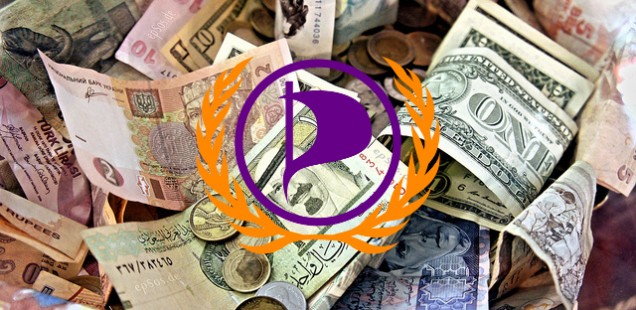PPI Board Cannot Collect Fees, says Court of Arbitration | PirateTimes

PPI Board Cannot Collect Fees, says Court of Arbitration
On the afternoon of Tuesday 30 December 2014 (CET) the Pirate Parties International (PPI) Court of Arbitration (CoA) ruled that the PPI Board does not have the authority to request payment affiliation fees from its members.
The decision relates to an application made by Pirate Party Australia (PPAU) that questioned the validity of a motion relating to fees that was passed at the PPI Paris 2014 General Assembly conference. PPAU’s application alleged that the motion instituting fees was not passed with the two-thirds majority of the votes cast by PPI members, meaning that the Board could not collect affiliation fees. It also called into question the adequacy of PPI’s banking arrangements and the management of PPI’s finances. In total, the application made seven requests.
When Pirate Times first covered the issue the PPI Board was contacted for comment, but publication occurred before the statement was received — the Board waited to discuss it at their meeting on Friday 26 December, and the statement was received on 30 December, just prior to the decision being given. The diplomatic but assertive statement, made on behalf of the Board by Chief Administrative Officer Thomas Gaul, reads as follows:
We are an open Board, we meet and discuss in public, everything is as transparent as possible, meetings are recorded and we are accessible to anyone at any time.
We are elected to serve our members’ will and act within the frame of the core principles of pirate movement.
Any party member of PPI can send a complaint to the Court of Arbitration that has the exclusive power to investigate and resolve internal disputes.
If any PPI member disagrees with the statutes or the mission of PPI, then the only thing that it has to do, is to put a motion to the next General Assembly and let all members decide.
The board has the task to fulfill the duties been given. Given by the members through the statutes and decisions from the general assembly – our highest common authority.
Although within the Board there are different approaches for the same issues and some might believe we are divided, we are not. We always try to bridge any gap arising. The board is a democratic body. And last, not least we, the board, act on behalf of our members.
We have our vision for PPI and we stand for it.
The CoA ruled that the General Assembly did not validly pass a motion to institute membership fees: the vote failed to meet the required threshold of two-thirds of PPI’s members, and so could not have carried according to the PPI statutes. While this means the PPI Board is prohibited from requesting affiliation fees from its members until such a motion is carried, the PPI Board is not prevented from seeking and receiving donations.
The CoA declined to rule as to how fees are to be calculated, the specific requirements for motions, or the extent to which affiliation fees apply to observer members, preferring these issues (determined to be non-urgent) to be dealt with by the General Assembly. Interestingly, the Court also declined to make a determination of the competence of the Board in regard to the management of PPI’s finances, specifically the maintenance of suitable banking arrangements.
In a statement to Pirate Times, Brendan Molloy, President of Pirate Party Australia, said:
It has now been confirmed by the CoA that General Assemblies are not running as effectively as required for a well-functioning and healthy political international. We look forward to being granted the opportunity to work together as equals as part of an online General Assembly to solve these governance and statute issues for a stronger organisation.
Mr Gaul appears to be optimistic about the effect of the decision on PPI. Gaul said in email wishing Pirates a Happy New Year:
The General Assembly in Paris decided to push forward with a funding stream for PPI with affiliation dues. This was a big step, as it showed most of the parties realized that NGO work cannot happen without money, ensuring the elected board does not have to pay everything out of their own pocket.
However, the CoA have just ruled against this motion. I am quite sure this will only be a small step backwards. Two steps forward will follow, I am sure of that.
The implications of the decision are likely to be minimal at this stage. This post was updated 5 January 2015 to clarify the voting requirements. PPI only recently started looking at receiving affiliation fees, and the General Assembly to be held in Warsaw is barely six months away. Frank discussions will be necessary to resolve many outstanding issues, but importantly a strong case will need to be made for fees given the threshold is substantially higher than that of ordinary motions.
Featured image: CC BY-SA from PPI and epSos .de

About Mozart Olbrycht-Palmer
I’ve been a member of Pirate Party Australia since 2011. I am the current Press and Inquiries Officer, and was previously on the board of Pirate Party Australia, as well as overseeing policy development. I was also once a member of the Pirate Parties International Court of Arbitration. I have a degree in music, and am nearly finished a degree in law. I live near Sydney.
All content is CC-BY if not mentioned otherwise. Please link back to us if using content.














Anton Nordenfur